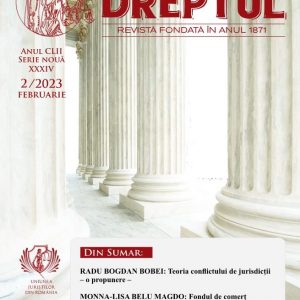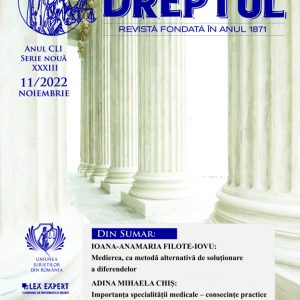-

-

-

-

-

-

-

-

-
 This paper is the first part of a more extensive commentary on Article 5 of the European Convention on Human Rights, which will be entirely published in three consecutive issues of this law journal. The present work assesses the general features of the right to liberty and security as they emerge from the relevant case-law of the European Court on Human Rights. On this occasion, it underlines the purpose of this right, namely the protection of the individual from arbitrariness, and it analyses the general conditions for deprivation of liberty. It also goes on to evaluate the first two such situations of authorised deprivation of liberty enshrined in Article 5 § 1 a) and b) of the Convention.
This paper is the first part of a more extensive commentary on Article 5 of the European Convention on Human Rights, which will be entirely published in three consecutive issues of this law journal. The present work assesses the general features of the right to liberty and security as they emerge from the relevant case-law of the European Court on Human Rights. On this occasion, it underlines the purpose of this right, namely the protection of the individual from arbitrariness, and it analyses the general conditions for deprivation of liberty. It also goes on to evaluate the first two such situations of authorised deprivation of liberty enshrined in Article 5 § 1 a) and b) of the Convention. -
 As a result of the increase in the number of attacks of the specimens of wild game species listed in the Annexes №. 1 and 2 of the Law №. 407/2006 on hunting and wild game protection, with subsequent amendments and completions, resulting in injury or death of an individual, given that wild game specimens are managed under the special law, the Romanian legislator was obliged to regulate liability for damages thus caused, responsibility that lies with the central public authorities responsible for hunting and/or the central public authorities responsible for the environment. Our research addresses this form of liability as a novelty in the landscape of Romanian law, with all the range of effects it generates, in the sense of highlighting its special character in relation to the common law regulation of tortious liability of objective type, in terms of calculation of the material and moral component of the damage created as a result of the attack produced by a specimen of the wildlife species on a human, an attack capable of causing injury or even death of the victim. We critically analyzed the text of Article 131 of Law №. 407/2006, with subsequent amendments and completions, considering, as a final conclusion of the study, that it is necessary to reform it as a matter of urgency, all the more so as there are serious doubts about the content of the regulation regarding the observance of the principle of constitutional rank of non-discrimination, as well as its concordance with the values of the ECHR, even in the context in which the state, as a subject of law, has been recognized the possibility of capping different types of compensation.
As a result of the increase in the number of attacks of the specimens of wild game species listed in the Annexes №. 1 and 2 of the Law №. 407/2006 on hunting and wild game protection, with subsequent amendments and completions, resulting in injury or death of an individual, given that wild game specimens are managed under the special law, the Romanian legislator was obliged to regulate liability for damages thus caused, responsibility that lies with the central public authorities responsible for hunting and/or the central public authorities responsible for the environment. Our research addresses this form of liability as a novelty in the landscape of Romanian law, with all the range of effects it generates, in the sense of highlighting its special character in relation to the common law regulation of tortious liability of objective type, in terms of calculation of the material and moral component of the damage created as a result of the attack produced by a specimen of the wildlife species on a human, an attack capable of causing injury or even death of the victim. We critically analyzed the text of Article 131 of Law №. 407/2006, with subsequent amendments and completions, considering, as a final conclusion of the study, that it is necessary to reform it as a matter of urgency, all the more so as there are serious doubts about the content of the regulation regarding the observance of the principle of constitutional rank of non-discrimination, as well as its concordance with the values of the ECHR, even in the context in which the state, as a subject of law, has been recognized the possibility of capping different types of compensation. -
 As by Article 24 of the Law No 140/2022 the legislator imposed on the National Authority for the Protection of the Rights of Persons with Disabilities and the Superior Council of the Magistracy obligations aimed at assessing the impact of this normative act, accompanied by possible proposals for its improvement, it is obvious that the legislator itself did not exclude that his legislative work does not constitute the masterpiece in the field. In this context, the present approach is intended to continue to emphasize, by the doctrine, some shortcomings of the Law No 140/2022 and to already propose a genuine reform in the matter. In the spirit of respecting the right to dignity of the persons with severe intellectual and psychosocial disabilities, a right that requires that a person who has acquired by law a full capacity of exercise should not be subjected to the degrading treatment of losing, totally or partially, this capacity, in the following we propose to be introduced, in the matter of capacity of exercise, the institutions of assisted capacity of exercise and of supervised capacity of exercise. Consequently, it required either the replacement of the institution of guardianship with the existing one, that of the personal assistant, as the case may be, of the professional personal assistant, or a specialization in the matter of guardianship, for such persons, of the sort of administrative guardianship.
As by Article 24 of the Law No 140/2022 the legislator imposed on the National Authority for the Protection of the Rights of Persons with Disabilities and the Superior Council of the Magistracy obligations aimed at assessing the impact of this normative act, accompanied by possible proposals for its improvement, it is obvious that the legislator itself did not exclude that his legislative work does not constitute the masterpiece in the field. In this context, the present approach is intended to continue to emphasize, by the doctrine, some shortcomings of the Law No 140/2022 and to already propose a genuine reform in the matter. In the spirit of respecting the right to dignity of the persons with severe intellectual and psychosocial disabilities, a right that requires that a person who has acquired by law a full capacity of exercise should not be subjected to the degrading treatment of losing, totally or partially, this capacity, in the following we propose to be introduced, in the matter of capacity of exercise, the institutions of assisted capacity of exercise and of supervised capacity of exercise. Consequently, it required either the replacement of the institution of guardianship with the existing one, that of the personal assistant, as the case may be, of the professional personal assistant, or a specialization in the matter of guardianship, for such persons, of the sort of administrative guardianship. -
 Declaration of the unconstitutionality of the Article 164 (1) Civil Code provisions has determined the adoption, with an unjustified delay, of the Law No 140/2022 on some protection measures for people with intellectual and psychosocial disabilities and the modification and completion of some normative acts, which establish assistance for the conclusion of legal acts, judicial counseling and special guardianship, as well as a clear and flexible procedure for the establishment of these protection measures. Every person must be free to act in order to develop his/her personality, the state, by virtue of its social character, having the obligation to regulate a normative framework to ensure respect for the individual, the full expression of the personality of citizens, of their rights and freedoms, of the equal opportunities, resulting in respect for human dignity.
Declaration of the unconstitutionality of the Article 164 (1) Civil Code provisions has determined the adoption, with an unjustified delay, of the Law No 140/2022 on some protection measures for people with intellectual and psychosocial disabilities and the modification and completion of some normative acts, which establish assistance for the conclusion of legal acts, judicial counseling and special guardianship, as well as a clear and flexible procedure for the establishment of these protection measures. Every person must be free to act in order to develop his/her personality, the state, by virtue of its social character, having the obligation to regulate a normative framework to ensure respect for the individual, the full expression of the personality of citizens, of their rights and freedoms, of the equal opportunities, resulting in respect for human dignity.
